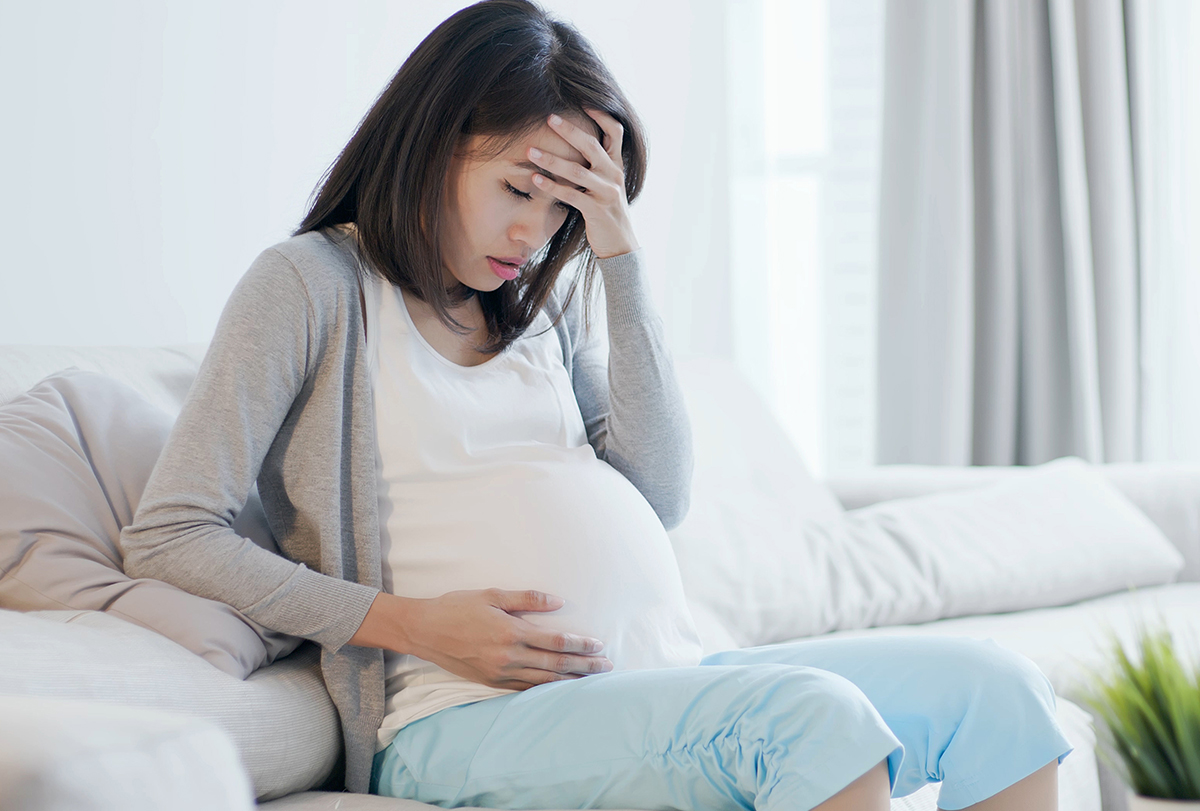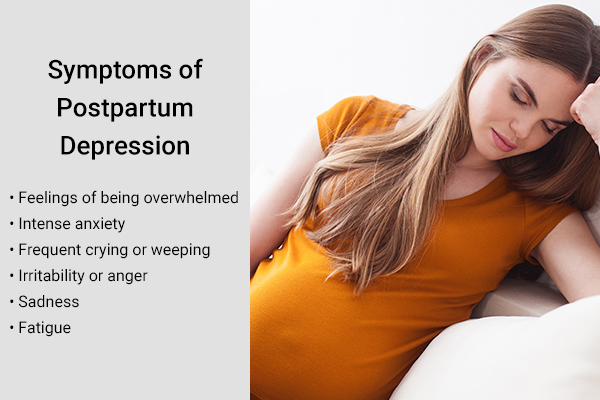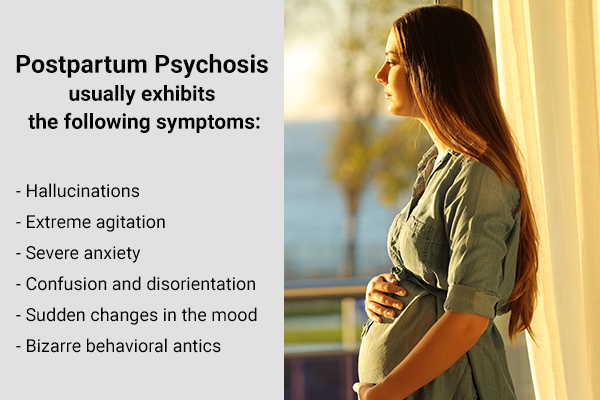In this article:
Pregnancy can be one of the happiest times in a woman’s life. However, there are several changes that occur during the postpartum period. Postpartum depression is one problem that some women have to deal with.

Postpartum depression (PPD) is a type of mood disorder that can occur in women after childbirth. (1) A combination of biological, physical, and emotional factors may lead to this problem. (1)(2)
The levels of estrogen and progesterone in the body fluctuate dramatically after delivery. These hormones are linked with neurotransmitters that affect a person’s mood. These chemical changes can contribute to postpartum depression. (3)(1)
An estimated 13%–15% of women develop postpartum depression in the first year after childbirth. This risk is substantially higher, up to 41%, in women who have a history of depression or other mood disorders before pregnancy. (3)(1)
What Are the Causes of and Risk Factors for Postpartum Depression
Postpartum depression is largely brought on by certain hormonal changes that take place in women following childbirth. However, there are some women who are more likely to experience postpartum depression than others, due to the following risk factors:
- If they have a personal history of depression, bipolar disorder, or other mental health conditions of the like
- If mental health issues such as depression or bipolar syndrome run in their family
- If they lack a strong support network among family and friends
- If they experienced depressive episodes during pregnancy
- If they have previously struggled with a problematic pregnancy or childbirth in the past
- If they are in a financial crunch and have money constraints
- If they are going through an emotionally stressful phase, which can be due to personal as well as professional upheavals
- If they are below 20 years of age
- If they are grappling with alcoholism or illegal drug abuse
- If their pregnancy was unplanned or unwanted
- If they are raising a baby with special needs
- If they have a demanding baby that is difficult to care for
- If they have problems in breastfeeding their child
While the above-listed factors can make one increasingly susceptible to developing postpartum depression, the condition is not limited to high-risk women alone. This form of postnatal depression can affect any new mother, including those who have had a normal delivery and have given birth to a healthy child.
As a personal history of depression can increase the risk of postpartum depression, let your doctor know if you have struggled with depression or anxiety in the past. By taking special precautions, you may be able to reduce your risk of developing postpartum depression.
What Are the Symptoms of Postpartum Depression?

Major symptoms of postpartum depression include:
- Feelings of being overwhelmed
- Intense anxiety
- Frequent crying or weeping
- Irritability or anger
- Sadness
- Fatigue
- Feelings of worthlessness
- Changes in sleeping or eating habits
- Lack of concentration
- Intense worry about the baby or lack of interest in the newborn
Postpartum depression can also cause physical symptoms such as:
- Headaches
- Chest pain
- Hyperventilation
How Is Postpartum Depression Treated?
The following interventions have proven quite effective in reducing postpartum depression:
1. Self-Care measures
You need to help yourself before anyone else can help you. To that end, you can try opening up to your family and friends about your feelings and what kind of help you need from them. Give yourself time to unwind by doing things that make you happy.
A healthy diet along with regular exercise is essential to keep you in the best of spirits. Try to pack in as much sleep at night as possible, and keep recharging your batteries by taking rest breaks throughout the day.
Ask your partner, friends, or family to help out with the baby as much as possible. It is imperative that you don’t inundate yourself with mother duty.
2. Psychological therapy
Ask your doctor to recommend a self-help course or a course of therapy such as cognitive behavioral therapy (CBT), which can help you overcome the postpartum blues.
3. Medication for severe cases
If all other methods fail to improve your condition, the last resort is taking a doctor-prescribed antidepressant that is safe to consume while nursing.
What Is Postpartum Psychosis?

In rare instances, postpartum depression can acquire a rather extreme and possibly dangerous form, which is known as postpartum psychosis. This is a serious disorder that is characterized by a sudden onset, usually within a week or two after delivery and sometimes as early as the first two days.
A woman suffering from this extreme degree of psychosis is unable to differentiate between what is real and what’s not. Due to this kind of delirium, the patient can easily jeopardize her own health as well as that of the baby.
The risk of suicide and infanticide is imminent, and therefore hospitalization is usually required to keep the mother and the baby out of harm’s way.
A woman with postpartum psychosis usually exhibits the following symptoms:
- Hallucinations, which include seeing things that aren’t real or hearing imaginary voices
- Delusions characterized by feelings of paranoia as well as unfounded beliefs that defy logic
- Extreme agitation
- Severe anxiety
- Confusion and disorientation
- Sudden changes in the mood
- Bizarre behavioral antics
- Inability or refusal to eat or sleep
- Thoughts of harming or killing her baby
- Suicidal thoughts or attempts
How Can Postpartum Depression Affect Your Baby?
Being in the throes of postpartum depression can make it difficult for a woman to care for herself and her baby as well.
A perpetual case of postpartum depression can cause the following:
- The mother may find it difficult to care for herself and the baby as she may be skipping her routine visits to the doctor.
- The relationship between the mother and her baby may be strained, which may affect the baby’s feeding schedules. Breastmilk is the primary source of food for a baby.
- The baby may not be getting the medical attention and care required for his/her healthy development such as timely immunization and routine checkups.
- The baby’s cognitive health and developmental milestones may also be affected.
Final Word
The infant can be affected by the mother’s development of postpartum depression; therefore, it is crucial to recognize the signs and symptoms of postpartum depression. (2)(1) It is also important to seek treatment immediately if those signs or symptoms are present.
 Continue ReadingHow to Manage Postpartum Depression at Home
Continue ReadingHow to Manage Postpartum Depression at Home
- Was this article helpful?
- YES, THANKS!NOT REALLY


